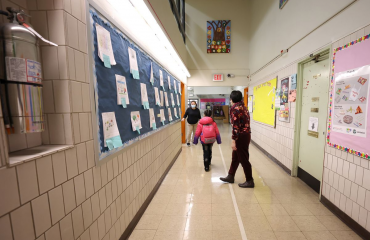Union: Jobs must be filled at Connecticut Valley Hospital – The Connecticut Mirror
CT Mirror
Connecticut’s Long-Form Journalism.
Unionized health care workers at the state-operated Connecticut Valley Hospital said staffing shortages have led to patient admissions closures and cut down the number of inpatient treatment beds available for detox services.
During a Tuesday news conference, they called on the governor and the state Department of Mental Health and Addiction Services to fill hundreds of vacancies at the hospital by April so that they can reopen beds and serve people suffering from drug addiction.
“We’re calling on them to restore and expand these services that our families so deserve in the state of Connecticut,” said Kim Piper, vice president of New England Health Care Employees Union, District 1199 SEIU.
Connecticut Valley Hospital provides 24-hour inpatient psychiatric and acute detox care through its Addiction Services Division in Middletown and at its Blue Hills Hospital campus in Hartford. A majority of patients are low-income residents and include those without health insurance.
Early state data show that 1,359 people in Connecticut died from drug overdoses last year.
SEIU members said the addiction division stopped taking new admissions in December, as directed by the state, with phone lines going unanswered. Piper said the reason given by DMHAS was that there weren’t enough staff, a situation exacerbated by the COVID-19 pandemic.
But she said that the shortage of workers and hiring issues at the hospital predate the pandemic and that the current situation resulted from a “lack of will” from state officials to find a solution.
“Part of that includes really having a plan, a solution, now,” Piper said. “We’ve asked for that for years, we’ve presented them with every possible proposal to really address this problem. There has just not been a real emergency and urgency to address this.”
Union officials estimate there are 330 vacancies at Connecticut Valley Hospital, including 62 positions in addiction services, that they want filled by the end of April.
DMHAS officials did not confirm the exact number of vacancies at the hospital and its treatment divisions or comment on the union’s demands. But in an emailed statement, the department said admissions to substance use treatment are not currently closed.
“Over the course of the pandemic, clients or staff who have been on the substance use treatment units have tested positive for the COVID virus,” officials stated. “During these occurrences DMHAS, following guidance from the CDC and the [state] Department of Public Health, has quarantined the units and temporarily halted admissions.”
DMHAS added that it continues to actively recruit for any vacancies.
Join in the work of CT Mirror
You may not be on staff, but you can produce the journalism.
Your contribution is appreciated.
The human cost to these individuals and their families when treatment is delayed or denied is incalculable.
But Brian Williams, a certified addictions counselor at the hospital, said the damage has already been done.
“There were hundreds of voicemail messages that were left, and now attempts are being made to review these voicemail messages to respond,” he said. “If anybody knows anything about addiction treatment, timing is critical. When they called two weeks ago, it was a critical moment. Having that voicemail message today and trying to play catch-up, it may be too late.”
Williams said he’s seen the staffing shortages and limited bed capacity impact patients referred for treatment by the state’s Court Support Services Division, where people are either in custody or on probation and need treatment for a substance use disorder.
National studies show that people newly released from prison are at a much higher risk of dying from an opioid overdose than the general population.
“The human cost to these individuals and their families when treatment is delayed or denied is incalculable,” Williams said.
When people can’t immediately get into treatment and detox, Emily McEvoy said, the responsibility to care for them then falls onto the private and nonprofit sector. McEvoy is a board member on the New Britain Racial Justice Coalition and an activist in Middletown.
“Hotels, motels in town – that’s where people end up going, especially if they’re unhoused,” she said. “And so then it becomes an issue of volunteers dealing with these crises, and it’s really upsetting.”
Union members said vacant positions at the hospital are already funded and just have yet to be filled, though incentives like higher wages, better benefits and less mandated overtime could help attract more qualified applicants and retain them going forward.
Professionals who work in addiction services include physicians, psychiatrists, nurses, counselors and support staff.
“The number of mandatory overtime shifts that people had to do are so overwhelming that it’s virtually impossible to keep them,” Williams said of some new hires.
At the time of the union news conference on Tuesday, the state’s bed availability monitoring system showed no treatment beds available for medically managed detox at Connecticut Valley Hospital in Middletown and its Blue Hills Hospital site in Hartford.
By Thursday afternoon, the site updated to show five open treatment beds in Hartford and 16 in Middletown.
The Connecticut Mirror is a nonprofit newsroom. 90% of our revenue comes from people like you. If you value our reporting please consider making a donation. You’ll enjoy reading CT Mirror even more knowing you helped make it happen.
The Connecticut News Project, Inc. 1049 Asylum Avenue, Hartford, CT 06105. Phone: 860-218-6380



